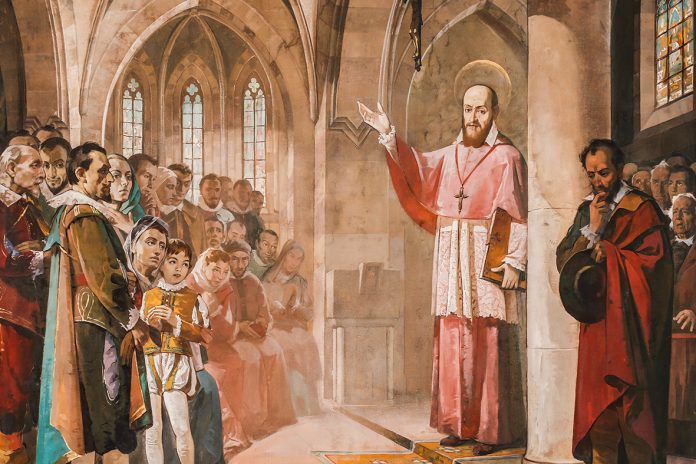Rome (Italy). Saint Francis de Sales, patron of the Salesian Family and of the Institute of the Daughters of Mary Help of Christians, was recognized by the Church as “Doctor” by Pius IX on 16 November 1877, with a “Brief” entitled “Dives in Misericordia” in which is stated that the Saint “painted virtue with bright colors in another work entitled ‘Philotea’, making thorny places simple and rough roads level, to show all faithful Christians an easy way to arrive there”.
In fact, he was a distinguished educator in the spiritual life. He accompanied with wisdom and kindness all those who approached him, indicating that it is possible for everyone to attain holiness, but for each there is a different way. It was a novelty for those times. His numerous writings document the depth of this intuition, which remains fundamental for any Christian educator. Fr. Morand Wirth, Salesian of Don Bosco, in the book, “Francis of Sales and education” illustrates “the thought of Francis of Sales on education and formation in the cultural context of Humanism” explaining and documenting that the Saint had a clear idea and also an educational practice that speak to men and women today.
Saint Francis knows well the human heart and helps those he accompanies to know themselves. This is the first step, never exhausted, of the growth journey. He wrote to Saint Frances di Chantal, “As a good father who holds his son by the hand will adapt his steps to your steps; he will be happy not to go faster than you.” And in the Filotea, he reiterates that “The exercise of the purification of the soul can and must end only with life. Therefore, let us not fret about our imperfections; what is asked of us is to fight them.”
As we know, one of the characteristic features of Salesian spirituality, which Don Bosco made his own, was sweetness. He himself recounts in the Memoirs of the Oratory: “It [the Oratory] began to be called Saint Francis de Sales for two reasons: 1a. because the Marquise Barolo had in mind to found a congregation of priests under this title, and with this intention had ordered the execution of the painting of this saint that still remains in the entrance of the same premises; 2a. because the fact that our ministry demands great calm and meekness, we were put under the protection of this saint, so that he might obtain from God the grace to be able to imitate him in his extraordinary meekness and in winning souls”.
The Holy Doctor binds sweetness to humility with an incisive statement, “Humility makes us grow in perfection before God and sweetness before our neighbor… Be careful, Philotea: this mystical chrism composed of sweetness and humility must be inside your heart” (Philotea III,8)
How is this very important virtue cultivated in relationships and, especially, in education? He responds, “One of the most effective ways to achieve sweetness is to exercise it towards yourself, never being angry with yourself and your imperfections…You must believe me, Philotea; the observations of a father, if made with sweetness and cordiality, have much more efficacy to correct the child, than anger and outbursts. The same thing happens when our heart has fallen into some guilt. If we take it up again with gentle and serene observations and show it more compassion than passion, we encourage it to correct itself. Repentance will be much deeper and will penetrate it more than a repentance full of spite, anger, and threats.” (Philotea III, 9)
Whoever wants to be a good educator must therefore first of all become that for oneself. And then, as we all know, there is no war that does not begin with oneself and with one’s own distortions.
Etty Hillesum wrote a few months before she died in a concentration camp, “It is precisely the only chance we have, Klaas. I see no other alternative. Each of us must gather and destroy in ourselves what we believe that makes us think we have to destroy others. And let us convince ourselves that every atom of hatred that we add to the world makes it even more inhospitable”.
Mother Chiara Cazzuola, in a good night to the Community “Mother Ersilia Canta” of Rome, of the Preprovince Mary Mother of the Church (RMC), reflecting on the words of the Pope’s Angelus of 24 December 2023, said, “God always acts with gentle love that embraces, that enriches, that safeguards, without violence, without wounding freedom. This is God’s way of acting.” She reminded that, “kindness and patience are our way of countering today’s climate of aggression and violence (…) In Mornese, they did not go to sleep without having apologized for any slights. Don Bosco, in the wake of Francesco di Sales, said that with kindness you can win hearts… Mother Mazzarello showed a kind attitude towards everyone, so much so, that those who approached her wondered what noble family she belonged to.
Along this line, we too can remember to control the way we behave to offer the best of ourselves to others and recover these attitudes typical of our spirituality”.





















La dolcezza e l’umiltà sono le virtù che aprono il cuore alla Parola del Signore e al dono ai fratelli!